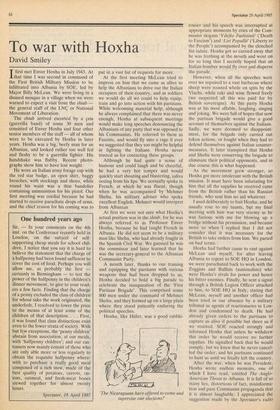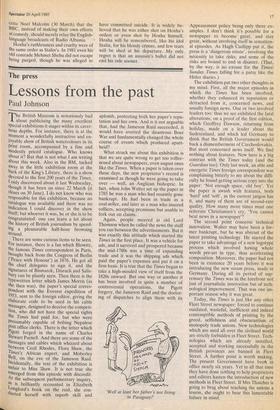To war with Hoxha
David Smiley
T first met Enver Hoxha in July 1943. At ithat time I was second in command of the First British Military Mission to be infiltrated into Albania by SOE, led by Major Billy McLean. We were living in a disused mosque in a village when we were. warned to expect a visit from the shtab the general staff of the LNc or National Movement of Liberation.
The shtab arrived escorted by a seta (guerrilla band) of some 30 men and consisted of Enver Hoxha and four other senior members of the staff — all of whom were to be executed by Hoxha in later years. Hoxha was a big, beefy man for an Albanian, and looked rather too well fed and fleshy to be a guerrilla fighter. His handshake was flabby. Recent photo- graphs show him to have lost weight.
He wore an Italian army forage cap with the red star badge, an open shirt, baggy breeches, with stockings and shoes, while round his waist was a thin bandolier containing ammunition for his pistol. Our first meeting was cordial because he had started to receive parachute drops of arms, and the chief reason for his coming was to put in a vast list of requests for more.
At the first meeting McLean tried to impress on him that we came as allies to help the Albanians to drive out the Italian occupiers of their country, and as soldiers we would do all we could to help equip, train and go into action with his partisans. While welcoming material help, although he always complained that there was never enough, Hoxha at subsequent meetings would make long speeches denouncing the Albanians of any party that was opposed to his Communists. He referred to them as Fascists, and would fly into a rage if ever we suggested that they too might be helpful in fighting the Italians. Hoxha never trusted us for contacting these groups.
Although he had quite a sense of humour and could laugh and be cheerful, he had a very hot temper and would quickly start shouting and blustering, saliva oozing from his lips. We normally spoke in French, at which he was fluent, though when he was accompanied by Mehmet Shehu, his military adviser who spoke excellent English, Mehmet would interpret from Albanian At first we were not sure what Hoxha's actual position was in the shtab, for he was always referred to as Professor Enver Hoxha, because he had taught French in Albania. He did not seem to be a military man like Shehu, who had already fought in the Spanish Civil War. We guessed he was the commissar and later learned that he was the secretary-general to the Albanian Communist Party.
A month later, thanks to our training and equipping the partisans with various weapons that had been dropped to us, Hoxha decided to hold a big parade to celebrate the inauguration of the 'First Partisan Brigade'. This comprised some 800 men under the command of Mehmet Shehu, and they formed up on a large plain where they stood patiently enduring the political speeches.
Hoxha, like Hitler, was a good rabble- 'The Nicaraguans have offered to come and supervise our elections!' rouser and his speech was interrupted at appropriate moments by cries of the Com- munist slogans 'Vdejke Fashisinit' ('Death to Fascism') and 'Liri Popullit' ('Liberty to the People') accompanied by the clenched fist salute. Hoxha got so carried away that he was frothing at the mouth and went on for so long that I secretly hoped that an Italian bomber would fly over and disperse the parade.
However, when all the speeches were over we repaired to a vast barbecue where sheep were roasted whole on spits by the Vlachs, while raki and wine flowed freely (we suspected all this was paid for by British sovereigns). At this party Hoxha was at his most affable, laughing, singing and joking. We were full of hopes that now the partisan brigade would give a good account of themselves against the Italians. Sadly, we were doomed to disappoint- ment, for the brigade only carried out token actions, or fought when they had to defend themselves against Italian counter- measures. It later transpired that Hoxha and Shehu were conserving the brigade to eliminate their political opponents, and in due course this is what happened.
As the movement grew stronger, so Hoxha got more intolerant with the British mission. It must have been infuriating for him that all the supplies he received came from the British rather than his Russian friends, who sent him no aid whatever.
I used deliberately to bait Hoxha, and he usually rose to my taunts, but my final meeting with him was very stormy as he was furious with me for blowing up a bridge without his permission, and became more so when I replied that I did not consider that it was necessary for the British to take orders from him. We parted on bad terms.
Hoxha had further cause to rant against McLean and myself, for after leaving Albania to report to SOE HQ in London, we were parachuted back to work with the Zoggists and Ballists (nationalists) who were Hoxha's rivals for power and hence his bitter enemies. Finally, he sent a signal through a British Legion Officer attached to him, to SOE HO in Italy, stating that McLean, myself and another officer had been tried in our absence by a military tribunal as agents of reactionaries in Lon- don and condemned to death. He had already given orders to the partisans to capture us alive if possible but shoot us if we resisted. SOE reacted strongly and informed Hoxha that unless he withdrew this order he would receive no further supplies. He signalled back that he would comply, but we knew that he never cancel- led the order, and his partisans continued to hunt us until we finally left the country.
After the war, when he was President, Hoxha wrote endless memoirs, one of which I have read, entitled The Anglo- American Threat to Albania. It is full of so many lies, distortions of fact, misinforma- tion and pure Communist propaganda that it is almost laughable. I appreciated the suggestion made by the Spectator's radio critic Noel Malcolm (30 March) that the BBC, instead of making their own efforts at comedy, should merely relay the English- language broadcasts of Radio Albania.
Hoxha's ruthlessness and cruelty were of the same order as Stalin's. In 1981 even his old comrade Mehmet Shehu did not escape being purged, though he was alleged to have committed suicide. It is widely be- lieved that he was either shot on Hoxha's orders or even shot by Hoxha himself. Hoxha will be remembered, like his idol Stalin, for his bloody crimes, and few tears will be shed at his departure. My only regret is that an assassin's bullet did not end his rule sooner.















































 Previous page
Previous page